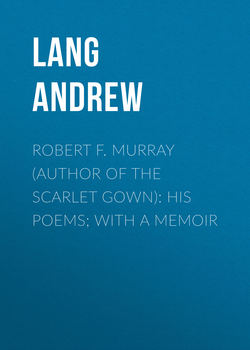Читать книгу Robert F. Murray (Author of the Scarlet Gown): His Poems; with a Memoir - Lang Andrew, May Kendall - Страница 5
A DECEMBER DAY
ОглавлениеBlue, blue is the sea to-day,
Warmly the light
Sleeps on St. Andrews Bay —
Blue, fringed with white.
That’s no December sky!
Surely ’tis June
Holds now her state on high,
Queen of the noon.
Only the tree-tops bare
Crowning the hill,
Clear-cut in perfect air,
Warn us that still
Winter, the aged chief,
Mighty in power,
Exiles the tender leaf,
Exiles the flower.
Is there a heart to-day,
A heart that grieves
For flowers that fade away,
For fallen leaves?
Oh, not in leaves or flowers
Endures the charm
That clothes those naked towers
With love-light warm.
O dear St. Andrews Bay,
Winter or Spring
Gives not nor takes away
Memories that cling
All round thy girdling reefs,
That walk thy shore,
Memories of joys and griefs
Ours evermore.
‘I have not worked for my classes this session,’ he writes (1884), ‘and shall not take any places.’ The five or six most distinguished pupils used, at least in my time, to receive prize-books decorated with the University’s arms. These prize-men, no doubt, held the ‘places’ alluded to by Murray. If he was idle, ‘I speak of him but brotherly,’ having never held any ‘place’ but that of second to Mr. Wallace, now Professor of Moral Philosophy at Oxford, in the Greek Class (Mr. Sellar’s). Why was one so idle, in Latin (Mr. Shairp), in Morals (Mr. Ferrier), in Logic (Mr. Veitch)? but Logic was unintelligible.
‘I must confess,’ remarks Murray, in a similar spirit of pensive regret, ‘that I have not had any ambition to distinguish myself either in Knight’s (Moral Philosophy) or in Butler’s.’ 1
Murray then speaks with some acrimony about earnest students, whose motive, he thinks, is a small ambition. But surely a man may be fond of metaphysics for the sweet sake of Queen Entelechy, and, moreover, these students looked forward to days in which real work would bear fruit.
‘You must grind up the opinions of Plato, Aristotle, and a lot of other men, concerning things about which they knew nothing, and we know nothing, taking these opinions at second or third hand, and never looking into the works of these men; for to a man who wants to take a place, there is no time for anything of that sort.’
Why not? The philosophers ought to be read in their own language, as they are now read. The remarks on the most fairy of philosophers – Plato; on the greatest of all minds, that of Aristotle, are boyish. Again ‘I speak but brotherly,’ remembering an old St. Leonard’s essay in which Virgil was called ‘the furtive Mantuan,’ and another, devoted to ridicule of Euripides. But Plato and Aristotle we never blasphemed.
Murray adds that he thinks, next year, of taking the highest Greek Class, and English Literature. In the latter, under Mr. Baynes, he took the first place, which he mentions casually to Mrs. Murray about a year after date: —
‘A sweet life and an idle
He lives from year to year,
Unknowing bit or bridle,
There are no Proctors here.’
In Greek, despite his enthusiastic admiration of the professor, Mr. Campbell, he did not much enjoy himself: —
‘Thrice happy are those
Who ne’er heard of Greek Prose —
Or Greek Poetry either, as far as that goes;
For Liddell and Scott
Shall cumber them not,
Nor Sargent nor Sidgwick shall break their repose.
But I, late at night,
By the very bad light
Of very bad gas, must painfully write
Some stuff that a Greek
With his delicate cheek
Would smile at as ‘barbarous’ – faith, he well might.
* * * * *
So away with Greek Prose,
The source of my woes!
(This metre’s too tough, I must draw to a close.)
May Sargent be drowned
In the ocean profound,
And Sidgwick be food for the carrion crows!’
Greek prose is a stubborn thing, and the biographer remembers being told that his was ‘the best, with the worst mistakes’; also frequently by Mr. Sellar, that it was ‘bald.’ But Greek prose is splendid practice, and no less good practice is Greek and Latin verse. These exercises, so much sneered at, are the Dwellers on the Threshold of the life of letters. They are haunting forms of fear, but they have to be wrestled with, like the Angel (to change the figure), till they bless you, and make words become, in your hands, like the clay of the modeller. Could we write Greek like Mr. Jebb, we would never write anything else.
1
Mr. Butler lectures on Physics, or, as it is called in Scotland, Natural Philosophy.
